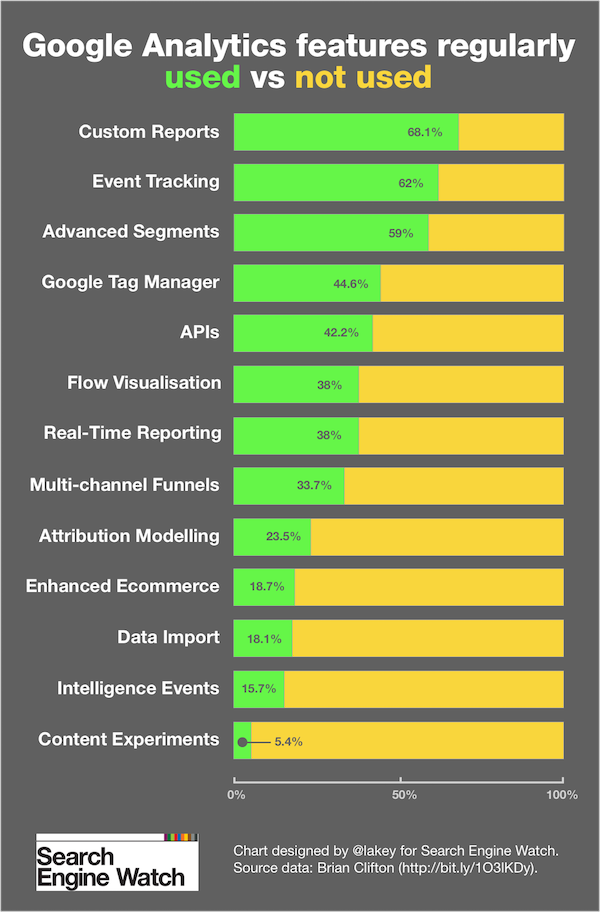Back in 2003 Google bought a company called Urchin Software, and subsequently launched the first free, commercial-grade analytics platform. How time flies!
Since then many of us have become seasoned users of Google Analytics, though it’s such a powerful, ever-evolving tool that I for one have still to get to grips with a bunch of the features. It turns out I’m not alone.
I spotted this post from Brian Clifton, who used to be Head of Web Analytics for Google Europe back in the day.
In it Brian references a survey that shows the relative adoption of 13 “essential” features, which he says are key to really understanding how people use your website.
The live survey is currently based on responses from around 200 people. It is still open and it would be good to grow the sample size, so if you use Google Analytics and can spare 30 seconds then pleaseaim here.
So how are people using Google Analytics? And what features are yet to be adopted by the masses?


Winning
More than two-thirds of Google Analytics users have set up Custom Reports.
There’s really no excuse not to try these out for yourself, given the amount of templates out in the wild for you to make use of, and the fast insight that Custom Reports can give you.
What else? Event Tracking and Advanced Segments are popular, but the rest of these features are only used by a minority of users.
Losing
Content Experiments is a major laggard, though it seems that this might be less to do with the adoption of A/B testing (or ‘multi-armed bandit experiments’, for that matter) and more linked to the difficulties in implementing Google’s kit.
The way Google Analytics is configured makes it tricky for marketing professionals to set up Content Experiments without the help of the tech team.
By contrast, other testing tools, such as Optimizely, are way easier to configure and continue to gain a lot of traction.
Other Google Analytics features such as Intelligence Events, Data Import and Enhanced Ecommerce are in need of more love, with fewer than one in five users bothering to make use of them.
Why the lack of traction?
I asked Brian for his thoughts on why some of the most powerful features are being ignored by analysts. The trouble, it seems, is that there aren’t actually enough analysts!
Organisations are simply not hiring dedicated analysts to work in this role. Even for very large brands spending a great deal of money online, what I find is that ‘analysis’ of their data is delegated to a person with other duties.In other words, a non-professional analyst who may spend a couple of hours per week looking at reports. In that scenario, only the basic features are ever scratched.
It seems odd that, in 2015, there is a deficit of analysts, given that web analytics is a relatively mature space. The entry point for using analytics is essentially free, but there’s always been the need for humans to interpret the data, to provide real insight.
So are we just paying lip service to web analytics? Businesses of all shapes and sizes will be able to tell you how many visitors they have, but what else should they be looking at? Brian says:
Regardless of business sector or website type, all sites must get the following three things done right if they are going to use data to improve their business.The first is Segmentation, as you really cannot perform any useful analysis if you are grouping all your visitors together.Then there is Campaign Tracking. Although I don't list it as a ‘ground-breaking feature’ in my survey, getting Campaign Tracking right is fundamental to understanding which half of your marketing budget is going down the drain.And third: Multi-Channel Funnels & Attribution Modelling. In other words, understanding your marketing mix (MCF) and their value to your business (AM).
Seems like most of us have work to do, and maybe some hiring too. Will 2016 be the year of advanced analytics? What do you think?
To view the original article Click Here

No comments:
Post a Comment